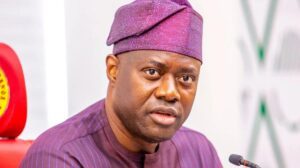Supreme Court fixes Monday to hear Atiku, Obi appeal against Tinubu
The Supreme Court has fixed Monday to hear Atiku Abubakar and Peter Obi’s appeal against President Bola Ahmed Tinubu.
The Supreme Court on Thursday fixed Monday, October 23 for the hearing of the case.
Recall the PDP candidate, Atiku Abubakar on September 19 filed 35 grounds appeal challenging the verdict of the presidential election petitions which upheld Tinubu’s victory in the election.
The five-member panel headed by Justice Hassan Tsammani on September 6 dismissed the petitions filed by Atiku and his Labour Party counterpart, Peter Obi, for lack of merit.
The former Vice President had also applied to the Supreme Court to file fresh evidence obtained from the Chicago State University against the president.
Atiku has continued to insist that Tinubu’s academic records are fraught with discrepancies and forgery and asked the apex court to kick him out of office.
At the hearing next week, the Supreme Court will unveil a seven-member team that will adjudicate and determine the case.
In his appeal, Atiku’s lead lawyer, Chris Uche, anchored the suit on 35 grounds.
Mr Uche, a Senior Advocate of Nigeria (SAN), said the five-member panel of the presidential election court erred in their verdict.
In court filings at the Supreme Court, Mr Uche contended that the PEPC’s judgement occasioned “grave error and miscarriage of justice” in its legal reasoning by upholding Mr Tinubu’s election as president.
In the document dated 18 September, Mr Uche contended that the presidential election court failed to adequately evaluate his client’s evidence before reaching its conclusions.
The lawyer faulted the court’s use of “disparaging words” against Atiku which “evinced bias.”
In another ground of appeal, Mr Uche told the Supreme Court that the lower court’s conclusions “did not represent the true picture of the grounds of his petition.”
He further contended, among other issues, that the presidential election court erred in law when it “failed to nullify the presidential election held on 25 February 2023 on the grounds of non-compliance with the Electoral Act, 2022, when by evidence before the tribunal, INEC conducted the election based on grave and gross misrepresentation contrary to the principles of the Electoral Act 2022, based on the “doctrine of legitimate expectation.”
Meanwhile, Atiku filed fresh evidence at the Supreme Court concerning the academic records of Mr Tinubu which the former vice president obtained from Chicago State University in the United States.
Although the issue of Mr Tinubu’s academic records was dismissed by the presidential election court, Atiku intends to breathe fresh life into it since he obtained the documents from the U.S.
In September, a U.S. court ordered the Chicago State University to release Mr Tinubu’s academic records to Atiku despite the president’s vehement opposition to the release of his transcripts.
In Obi’s appeal at the Supreme Court, his lawyer, Livy Uzoukwu, filed 51 grounds in challenging the presidential election court’s judgement.
Mr Uzoukwu, a SAN, argued that PEPC reached the wrong conclusions.
In one of the grounds, Mr Uzoukwu told the Supreme Court that the five-member panel of the Presidential Election Petition Court led by Haruna Tsammani “erred in law and thereby reached a wrong conclusion” when it dismissed Mr Obi’s suit.
He faulted the presidential election court’s evaluation of Mr Obi’s evidence. He said the court erroneously ruled that Mr Obi’s case failed to establish the polling stations where electoral malpractices took place during the February presidential election.
The lawyer also said the lower court’s conclusions caused a “grave miscarriage of justice” when it held that Mr Obi did not identify the specific number of votes he polled at polling units where he accused INEC and Mr Tinubu of suppression of votes.
The appellant’s lawyer urged the Supreme Court to determine if the presidential election court did not err in law when it based its reasons on the First Schedule of the Electoral Act 2022 to expunge Mr Obi’s witnesses’ statements on oath from the court’s records.
Some of Mr Obi’s key witnesses whom the five-member panel of the court dismissed their testimonies were a web engineer, Mpeh Ogar; and a statistician, Eric Uwadiagwu.
Mr Obi and Atiku had filed separate petitions at the PEPC accusing Nigeria’s electoral umpire, INEC, and Mr Tinubu of electoral malpractices. They contested Mr Tinubu’s qualification to stand for election and begged the PEPC to set aside the election.
But the court, in its decision, held that they failed to prove their claims of electoral fraud against INEC and the president. Another political party, APM, lodged the third suit alleging improper nomination of Mr Tinubu’s running mate and incumbent Vice President Kashim Shettima.
In its appeal at Supreme Supreme, APM’s lawyer, Chukwuma–Machukwu–Ume, a SAN, predicated his client’s suit on 10 grounds.
Mr Machukwu-Ume, a SAN, prayed the apex court to nullify the presidential election court verdict for its numerous errors in law.
He argued that sections 131 and 142 (1) of the 1991 Constitution are inextricably linked and neither can be confined as a pre-election matter, as these qualifications are conditions precedent to, for being elected into the office of President.
APM’s suit was not based solely on nomination, but primarily that President Tinubu contested the presidential election without a lawful running mate.
The party added that the withdrawal of Ibrahim Kabir Masari, a place-holder and the expiry of the 14 days permissible for changing and withdrawing of dead candidates under Section 33 of the Electoral Act 2022, rendered Mr Tinubu’s election and return, invalid.
Mr Tinubu, INEC and other respondents in the suits have urged the apex court to dismiss the appeals for being un-meritorious.
Mr Tinubu’s lawyer, Wole Olanipekun, a SAN, said Atiku and Mr Obi failed to prove all their allegations at the PEPC.
He said the court was right in arriving at its decision affirming Mr Tinubu’s victory.




